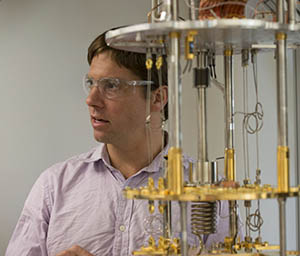Feb 25 2015
The Alfred P. Sloan Foundation announced Feb. 23 that Kater Murch, PhD, assistant professor of physics in Arts & Sciences at Washington University in St. Louis, has been awarded a 2015 Sloan Research Fellowship.
 Kater Murch (Joe Angeles/WUSTL Photos)
Kater Murch (Joe Angeles/WUSTL Photos)
He is among 126 outstanding U.S. and Canadian researchers selected as fellowship recipients this year. Awarded annually since 1955, the fellowships are given to early-career scientists and scholars whose achievements and potential identify them as rising stars, the next generation of scientific leaders.
“The beginning of one’s career is a crucial time in the life of a scientist. Building a lab, attracting funding in an increasingly competitive environment, and securing tenure all depend on doing innovative, original high-quality work and having that work recognized,” said Paul L. Joskow, president of the Alfred P. Sloan Foundation. “For more than 50 years, the Sloan Foundation has been proud to celebrate the achievements of extraordinary young scientists who are pushing the boundaries of scientific knowledge.”
“I am pleased that Kater has been named a Sloan Fellow,” said Mark Alford, PhD, professor and chair of physics in Arts & Sciences. “He has made major contributions to the development of specially engineered quantum systems in which quantum phenomena are controlled at ever increasing levels of detail.”
‘Our research group is focused on understanding and controlling ‘open quantum’ systems,” Murch said. “While everyday objects obey the laws of classical mechanics, single particles of light or matter follow instead the strange laws of quantum physics. But these particles are not easily isolated from their environment, and as soon as they interact with the outside world they lose their mysterious quantum properties.
“We study quantum systems that are not perfectly isolated and therefore interact with their environment. This interaction can be harnessed to observe quantum systems directly, without destroying them, and eventually, to control them.
“In studying open quantum systems, we hope to develop new ways to study novel phases of condensed matter, prepare quantum states, and probe chemical and biological systems,” Murch said.
Murch’s quantum system is a superconducting circuit called a qubit cooled to millikelvin temperatures. “We use nano-fabrication techniques to construct the quantum circuits and a dilution refrigerator to cool the systems to the quantum regime,” Murch said. “We then use microwave frequency signals to probe the quantum states of these circuits, and study the effect of this probing on the evolution of quantum states.”
Sloan Fellowships are awarded in eight scientific and technical fields: chemistry, computer science, economics, mathematics, computational and evolutionary molecular biology, neuroscience, ocean sciences and physics. Candidates must be nominated by their fellow scientists, and winning fellows are selected by an independent panel of senior scholars on the basis of a candidate’s research accomplishments, creativity and potential to become a leader in his or her field.
The Alfred P. Sloan Foundation is a philanthropic, not-for-profit grant making institution based in New York City. It was established in 1934 by Alfred Pritchard Sloan Jr., then-president and chief executive officer of the General Motors Corp.